When I won an Oregon Literary Fellowship this year, the award itself was more than I could ever have hoped for. But the fellowship also helped fund a research trip to Louisiana to finish my novel. That was an outstanding experience that I could only have dreamed of.
And that was all I ever expected.
But Literary Arts continues to offer its fellows amazing opportunities, including, this past week, a week’s retreat at a nearby writing cabin courtesy of a generous arrangement with the folks at Far Lookout.
I’ve finished the novel that earned me the fellowship this year, so I’m on to other projects now. At the moment I’m working on a story cycle set in Oregon during a natural apocalypse in the near future. (A comet or an asteroid, who knows what, slams into the moon and breaks of two huge chunks of the moon’s surface, which then plummet to earth and cause a catastrophic chain reaction of polar ice melt, planet-wide tectonic shifts, volcanic eruptions, biblical flooding, uncontrolled wildfires, and so on, and so on. Not that the destruction itself is really the point — I’m more interested in the people trying to survive it all.) You might remember it from my NaNoWriMo project a couple of years ago. It was a bit of a mess when I stopped work on it back then, and I’ve thrown out most of the work I did on it a couple of years ago, but the idea has stayed with me and I’m excited to return to it, so I figured I could use this week to start whipping it into shape.
It worked.
What follows are a few blog post-like entries I typed out at the ends of a few days, plus some photos my wife and I snapped with our smartphones.
August 18, 2013
It’s odd how well the trees and brambles can shelter one from sound. We are at the end of a narrow lane, barely room for two cars to pass each other, the bend in the road just a few hundred yards from the Willamette. But we’re also only a few blocks from a dense residential area, half a dozen blocks from a state highway. Trains rumble over a narrow bridge almost within eyesight but you’d hardly know it. Here in the cabin, past the whining iron gate and hidden in the tomato plants and grapevines, we are in another world.
It seems odd to be so at peace here in this cabin, so secure in this quiet residential neighborhood, when I’m here to write about the end of the world. Or the end of this world, anyway.
Today, we ventured down to the river and clambered over rocks to stand beneath the railway bridge. The thick stone pylons rose like obelisks from the river. Across the water, yachts floated at the docks of many-gabled mansions, and shirtless twenty-somethings cruised the river blaring classic rock or country songs. Their wakes lapping the boulders at the riverbank. A man picked his way out onto weathered knees of wood under the bridge to fish, and a young couple threw balls and sticks into the water for their playful pitbull to chase. I gazed up at the trestle and thought, When my world ends, even this will be gone, rocked loose in the earthquakes and washed away in the floods. But then a warm breeze blew and in the setting sun Jennifer skipped stones out into the water, and I wondered how I could ever write what I came here to write.
Now it is fifteen minutes to midnight, and I’ve been taking notes and reworking sentences for almost two hours while Jennifer sleeps. I have my pages of notes arranged on the wall, held up by magnets on a steel sheet, and I’m using the huge drafting paper on the cabin’s architect’s table to scribble titles and character names. I’ve been reading off and on all afternoon — books on natural disasters and extinction and horror, but also books on survival and human compassion — and I’m finding that just being here is enough to begin the work, that just knowing that I came here to write is more important than what I came here to write, and sure enough, the words are coming.
So it begins.
August 19, 2013
Today is my birthday, so I’ve been taking it easy. Lazed around on the couch, took a walk to the river, baked a blueberry pie. Still, I put in the writing time and managed to finish one story — or, at least, get it to a full-draft, ready-for-revision state — and make solid headway in another. I also spent some time reading, some time organizing, and some time sitting in the garden just thinking about things as I nibbled the wild grapes.
So it’s been a productive day but mostly I’ve been relaxing.
The last thing I did, though – besides writing this – was to prepare a formal writing schedule for the rest of my retreat days, which is as follows:
9 – 9:30 am
Sit in meditation
9:30 – 10 am
Breakfast
10 am– 12 pm
Write
12 – 1 pm
Lunch
1 – 2:30 pm
Time with Jennifer (sometimes we’ll go for walks, sometimes we’ll watch old episodes of Friends, sometimes we’ll just lie around and read)
2:30 – 5:30 pm
Read/write
5:30 – 7 pm
Dinner (includes prep time and dessert)
7 – 9 pm
More time with Jennifer
9 – 11 pm
Write (I’m a night owl, so I have coffee with dessert and I’m often up till midnight)
This is a tentative schedule: I’ll probably get earlier or later starts on everything, or switch things around from time to time. But it gives me some guidelines to work with, at least.
August 21, 2013
I’m sitting outside in a plastic lawn chair listening to the crickets and the distant highway traffic and, sometimes, a night bird I can’t identify as it calls into the late night. I almost typed “calls into the darkness,” but it’s not truly dark, even at 11:30 at night. There’s a sheer of cloud up high in the atmosphere, above the planes but sufficient to reflect the city lights of nearby Portland, and the stars are few enough I can count them: I can see ten at the moment; if I put away the laptop and unfocus my eyes, I might count two dozen. It’s light enough I can see the gravel and the wood steps to the cabin, and a near-full moon shows me the branches of a nearby tree.
I’ve been watching a Japanese movie from the late `50s, an Ozu film called Floating Weeds. I take a lot of inspiration from mid-century Japanese cinema and tonight is no different. Even though the film is set in a quiet Japanese fishing village a dozen years after WWII and my book is set in Oregon in the middle of a near-future natural apocalypse, I see an emotional connection between that film and my book. It’s quiet, and pensive, and contained; it deals with the ordinary lives of ordinary people and their fraught but ordinary emotions, and that is the thing I want most to focus on in my book: for all the destruction and chaos my apocalypse creates, I want more than anything to show my characters struggling with simple, mundane conflicts. How to love and what to eat for dinner and how to know who your friends are. But, sure enough, though I’ve made terrific headway on a few of the stories over the last couple of days, I’ve spent most of my time destroying the earth.
Destroying my beloved Oregon.
And sitting out here now among the crickets, looking into the lamplit evergreens with the Willamette drifting past just yards from my chair and the city of Portland audible in the distance, I find myself wonder what I’m doing. I love my city; I love my state. I feel defensive when people mock it, proud when it gets good press, protective and embracing. Especially Portland and its surrounding areas. I tell Portland good morning when I drive over bridges; I tell it goodnight when I gaze over it from hilltop parks. I joke with my wife that Portland is the only affair I’ll ever have.
So now, sitting out here among the cricketsong, I feel guilty at the fictional devastation I’m bringing it.
I think ultimately it has to do with fear. I grew up in Texas and while there are a great many things to celebrate about that state and my hometown, I have always written about Texas with trepidation. All my characters are always in conflict with it; frequently I use some version of the line that Texas is too big to get out of in a day, and I think I do that because I spent my whole life in Texas trying to escape it. I appreciate it now, but I know that a lot of that appreciation is only possible from a distance.
In Oregon, I have found my home. My people are here, my culture. Here I have sunk my roots. This is where I belong. So in the same way that I write fiction about people trapped in a Texas they long to escape, I suppose I’m now writing fiction about an Oregon I would be terrified to lose.
I’m still at a stage where I need to finish drafts, just get the stories down, and I’m not deluding myself that I’ll finish even that project during this writing retreat. But I think tonight I’ve set myself the rules by which I need to revise this whole book. And I’m reminding myself to approach the whole project not with a mind toward plot and world-building but with a care for the characters and a sense of this place I love so much.
August 22, 2013
I’m out on the back porch of the cabin and a light rain is falling over the corrugated plastic roof and tinging on the metal waterhose reel. The air smells fresh and mulchy from the dampened compost heap nearby. Earlier this afternoon, Jennifer and I sat out here and played a game a backgammon while out on the river a trio of rowdy jet skiers raced over each other’s wakes, the revved engines and the slap of the water obnoxious up here on the hill. But now the rain is muffling even the distant traffic and I feel even more pleasantly isolated than I did at the start of the week.
It’s funny the things that drive my work, the references that spark the mind. Earlier this morning, I checked in on Jennifer, who was in the cabin’s bedroom watching the first half of the last Harry Potter movie on her laptop. She started humming the Nick Cave song that plays in the tent scene between Harry and Hermione, and it got stuck in my head too, so I used my smartphone to find “O Children” on YouTube. Whoever uploaded the song patched together a montage of stills from the whole Harry Potter series, showing the three young actors growing up, but when the song came to the bit used in the film, the video switched to that sequence.
In it, Ron has just abandoned Harry and Hermione in a horcrux-fueled jealousy, and Hermione is listening to a tinny radio while sulking in a corner of the tent. When the Nick Cave song comes on, Harry decides to rouse her spirits by pulling her up to dance. It takes some cajoling, Harry swinging Hermione’s arms back and forth to dance her like a puppet, but after a few measures she breaks a smile and soon the two are laughing and dancing together in the tent.
And then the song ends, and Hermione’s face falls. She’s wearier than she ever was, and as Harry tries desperately to hang onto whatever good cheer he managed to conjure up, Hermione just shakes her head in resignation and turns away from him. Because they are still alone, lost and vulnerable, in a miserable situation. And dancing to a song hasn’t done anything to change that.
I couldn’t have asked for a more succinct reminder of the emotions felt by these characters I’m writing. And music has always been an inspiration for me while I work, so this was exactly what I needed this morning. I listened to the song on a loop four or five more times and I finished another story and started in on two more.
Then the day turned bright and beautiful and it was hard to concentrate on work, which is when Jennifer and I sat out back for some games and some afternoon drinks.
But now it’s dark and wet, the sound gone from the world except the sound of rain on the roof and somewhere blocks away a miserable dog begging to be let indoors. And I’m making my way deep into a fourth story today, probably the second I’ll actually finish before I go in for the night.
Or maybe I’ll just close the laptop and sit out here. And listen.
I was at the cabin for almost seven days — or, five full days and two half days. I worked a little the first day and a little second (my birthday). After that I stuck more or less to my schedule, getting the most writing done in the mornings and late at night. The last morning, I didn’t do any writing but I did scribble a few last-minute notes for the work I have left to do.
And I still have a lot of work to do. The project I’ve been working on is a story cycle consisting of twenty separate but related pieces. Even with the first drafts I knocked out (and mostly discarded) during the NaNoWriMo binge a couple of years ago, there’s no way I would have finished the whole book in less than a week. But as of this morning, I have finished six stories, five of them written from scratch and two of them very nearly ready to start sending out at individual pieces. I’ve also gotten more than halfway through three other stories and have several paragraphs and most of the ideas for two or three other stories. Altogether, that’s roughly half the book more or less finished. And on the Wall of Fiction I’ve compiled for this book, I have strong notes and the gist of the story for all but three of the other stories.
So, all in all, this was a hugely productive week, and I couldn’t have gotten all this work done without the generosity of the owners of Far Lookout Writer’s Cabin, Literary Arts, and of course my wife, who kept me motivated, gave me feedback on ideas, and documented a lot of the work I was doing.

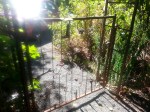
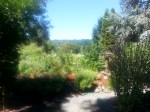
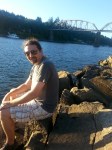
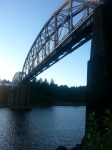
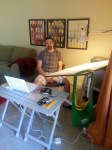
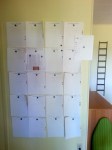






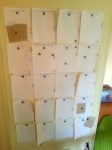



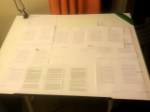
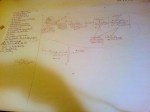
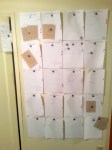

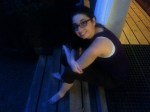
Wow, what a great experience. May your journey have much light and writing.
Thanks! So far so good — and since I’m teaching the story cycle in my lit seminar this Fall, I’ll be glad to have this story cycle of my own to work on. 🙂
One novel I’m deffo gonnae read, pal!
One thing I learned for certain from this time concentrating on the book: it’s going to take me a long while to finish it. I need to get comfortable with the characters and the situations, need the characters to become people and the weird scenarios I’m imagining to start feeling normal. My first story cycle took me a decade to finish, but that was off and on while working on two graduate degrees and teaching full time. Still, even when I sat down to hammer out the last half and pull everything together, it took me about a year of concentrated effort. This one won’t take a decade, but if I were to wind up polishing and revising the book as a whole by this time next year, I’d be awfully proud of myself.